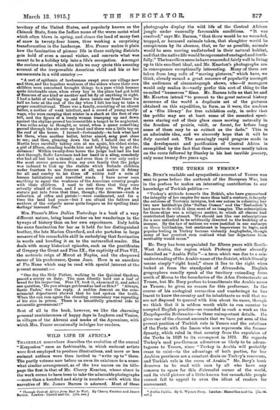SHE TURKS IN YEMEN.*
M. BURY'S readable and sympathetic' account of Yemen was sent to press before the outbreak of the Bunspean War, but in the preface he makes an interacting contribution to our knowledge of Turkish polities :— " Turkey's attitude towards the British, who have guaranteed the integrity of her empire for more than half a century, is lurgdy the outcome of Teutonic intrigue, but our action in retaining her two new battleships (the • Sultan Osman' and the • Reehadielt had more to do with it than most of us imagine. The subscription for those ships was a religious matter, to which all classes had contributed their utmost We should not like our subscriptions for a new cathedral to be arbitrarily diverted to the building of a mosque. By the law of nations we went justified in our embargo on those battleships, but eentiment is impervious to logic, and popular feeling in Turkey became violently Anglophobe, though many of her greatest men realized what her departure fmin neutrality would mean."
Mr. Bury has been acquainted for fifteen years with South- West Arabia, the region which Ptolemy rather absurdly described as "Arabia Felix "—a term which was due to a mill- understanding of the Arabic name of the district, which literally means simply "right hand," since it lies to the right when looked at from the standpoint of Alexandria. English geographers usually speak of the territory extending front south of Mecca to the boundaries of the Aden Protectorate an Yemen, but Mr. Bury prefers to transliterate the Arabia name as Yemen; be gives no reason for this preference. In the course of his zoological researches mid wandering.' he has learnt to know the country and its inhabitant. so well that we are not disposed to quarrel with him about its name, though we think that it is seldom worth while to run counter to accepted English practice—as recorded in much a work as the Encyclopaedia Britannica —in these unimportant details. Ito gives one of the clearest amounts that we have yet seen of the present position of Turkish rule in Yemen and the relations of the Porte with the Imam who now represents the former dynasty, which ailed in that country from the expulsion of the Turks in 1630 to its reconquest in 1871. He regards Turkey's mad pro-German adventure as likely to be advan- tageous to Yemen, since "Turkey in Arabia will probably cease to exist—to the advantage of both parties, for bee Arabian provinces are a constant drain on Turkey's resources, and Turkish rule is the curse of Arabia.' Mr. Bury's book deserves to ho read with care by all who have any concern to spare for this distressful corner of the world, and its vivid picture of a little-known but remarkable people cannot fail to appeal to even the idlest of readers for amusement.
• Arehia IefsiLr. By G. Wyman Bury. Leaden . Itanuillen Raul Coe net)


































 Previous page
Previous page